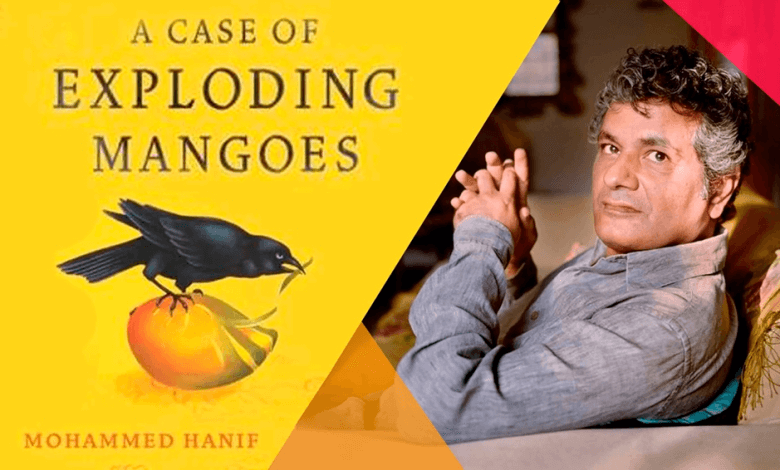
“A Case of Exploding Mangoes” is a satirical novel by Pakistani author Mohammed Hanif, first published in 2008. The novel revolves around the mysterious death of General Zia ul-Haq, Pakistan’s military dictator, in a plane crash in 1988. The story is narrated from the perspective of Ali Shigri, a junior officer at the military academy who is determined to avenge the death of his father, a former military officer who was executed on charges of conspiracy against the government. The novel is a darkly humorous take on the political and social landscape of Pakistan in the 1980s, exploring themes of power, corruption, and military dictatorship in a gripping and suspenseful plot.
Plot Summary of the Novel:
A Case of Exploding Mangoes is a satirical novel by Mohammed Hanif that explores the events leading up to the mysterious death of General Zia-ul-Haq, the military dictator of Pakistan in the 1980s.
The novel is told from multiple perspectives, with the main protagonist being Ali Shigri, a young Pakistani army officer who is haunted by his father’s death and becomes embroiled in a web of conspiracy and betrayal. He is a member of the elite Pakistan Military Academy, and as he progresses through his military training, he becomes increasingly disillusioned with the military’s corrupt and oppressive nature.
The novel is set in the months leading up to General Zia’s death, and follows the lives of several key characters who are connected to the events that led to his demise. General Zia is portrayed as a devout Muslim who is deeply corrupt and ruthless in his pursuit of power. He is surrounded by a cast of loyal supporters, including his military chief of staff, General Akhtar, and his American CIA liaison, Colonel Arnold.
As the novel progresses, Ali becomes increasingly convinced that General Zia is responsible for his father’s death and begins to plot his revenge. He befriends a group of dissidents who are also opposed to the military regime and becomes involved in a plot to overthrow General Zia.
The climax of the novel takes place during a military air show, where General Zia and his entourage are watching from a VIP tent. As the show reaches its finale, two fighter jets collide and crash into the VIP tent, killing everyone inside, including General Zia.
In the aftermath of the crash, Ali discovers that he has been betrayed by one of his closest allies and is forced to flee the country. The novel ends with Ali reflecting on the absurdity of the events that have transpired and the corrupt nature of those in power in Pakistan.
Political History Of Pakistan(In A Perfect Chronology From 1947)
Major Themes in A Case of Exploding Mangoes:
There are several major themes in “A Case of Exploding Mangoes” by Mohammed Hanif, including:
Power and Corruption:

“A Case of Exploding Mangoes” is a scathing critique of the military dictatorship of General Zia-ul-Haq in Pakistan during the 1980s. The novel portrays the General and his government as corrupt and oppressive, with those in power more concerned with their own interests and maintaining their grip on power than with the welfare of the country and its people.
Hanif exposes the inner workings of the government and military, showing how various factions and interest groups compete for power and influence, often at the expense of the common people. He also highlights the widespread corruption that exists within the government and military, with officials accepting bribes and engaging in other forms of illicit activity to enrich themselves.
Related Quotes:
- “I am the only person in this country who can look into the eyes of God and tell Him what to do” (page 85) – said by General Zia to his close confidant, General Akhtar, demonstrating his belief in his own power and authority.
- “We need a man who is corrupt, but predictable” (page 141) – said by General Rana to General Akhtar, showing the cynical attitude towards corruption within the military and government.
Oppression and Censorship:

“A Case of Exploding Mangoes” portrays the military dictatorship of General Zia-ul-Haq in Pakistan as a time of great oppression and censorship. Hanif highlights the ruthlessness of the regime and its efforts to suppress dissent and maintain control over the population.
Through the character of General Zia, Hanif shows how the regime silenced anyone who opposed it, often using violent and brutal means. The novel depicts the widespread use of torture, disappearances, and extrajudicial killings to silence dissent and maintain the regime’s grip on power.
Hanif also highlights the censorship that characterized this period, with the government controlling the media and censoring any information that was critical of the regime. The novel shows how the government controlled what people were allowed to read, watch, and listen to, and how this censorship stifled free speech and expression.
Related Quotes:
- “In this country, you can get away with anything as long as you use the right words” (page 45) – said by Major Kiyani to Ali Shigri, highlighting the importance of language and propaganda in controlling the population.
- “We’re living in a country where even our dreams are censored” (page 88) – said by the character of Baby O, reflecting on the suffocating atmosphere of censorship and oppression.
Our Lady of Alice Bhatti By M Hanif Summary and IMP Themes
Conspiracy and Betrayal:
“A Case of Exploding Mangoes” is a novel that is filled with conspiracies and betrayals, both personal and political. The novel depicts a world where loyalty and trust are constantly being tested, and where the pursuit of power can easily lead to betrayal.
Throughout the novel, Hanif shows how individuals are willing to betray their friends and allies in order to gain power or to protect themselves. He also shows how conspiracy and intrigue are woven into the fabric of the military and government, with individuals and factions vying for power and influence.
The character of Ali Shigri, the protagonist of the novel, is particularly affected by these themes of conspiracy and betrayal. He is torn between his loyalty to the military and his desire to uncover the truth about his father’s death, and he is constantly being manipulated and deceived by those around him.
Related Quotes:
- “In this game, loyalty is a liability” (page 49) – said by Major Kiyani to Ali Shigri, demonstrating the cynical attitude towards loyalty within the military.
- “The only thing more dangerous than a soldier who doesn’t know his orders is a soldier who thinks for himself” (page 112) – said by General Akhtar to Ali Shigri, highlighting the importance of obedience and conformity in the military.
Identity and Belonging:

“A Case of Exploding Mangoes” also explores themes of identity and belonging through the character of Ali Shigri.
Ali Shigri is a complex character who is torn between his loyalty to the military and his desire to uncover the truth about his father’s death. His father was a senior officer in the military who died in a mysterious plane crash, and Ali is determined to find out what really happened. This quest for the truth puts him at odds with his superiors in the military, and he is forced to question his own identity and loyalties.
In addition to his struggles within the military, Ali is also haunted by the memory of his mother, who abandoned him as a child. This has left him with a deep sense of loss and a feeling of not belonging anywhere.
Related Quotes:
- “It was as if my entire childhood had been just a rumour, and now, as a grown-up, I had to invent a new childhood for myself” (page 26) – said by Ali Shigri, reflecting on his struggle to find a sense of identity after his mother abandoned him as a child.
Characters’ Analysis of the Novel
Here is an analysis of some of the major characters in A Case of Exploding Mangoes:
Ali Shigri –
The protagonist of the novel, Ali Shigri is a young officer in the Pakistani military who becomes obsessed with finding out the truth behind his father’s death. He is torn between his loyalty to the military and his desire for justice, and his struggles with issues of identity and belonging are a central theme of the novel.
General Zia-ul-Haq –

The military dictator of Pakistan during the 1980s, General Zia is portrayed as a ruthless and manipulative leader who will stop at nothing to maintain his grip on power. He is deeply paranoid and suspicious of those around him, and his actions ultimately lead to his own downfall.
General Akhtar –
A powerful figure in the military and a close confidant of General Zia, General Akhtar is a cunning and calculating strategist who plays a key role in the political machinations that take place throughout the novel. He is a master of manipulation and intrigue, and his loyalty to General Zia is tested as the plot unfolds.
Major Kiyani –
A fellow officer and friend of Ali Shigri, Major Kiyani is a cynical and disillusioned figure who has lost faith in the ideals of the military. He is a sharp critic of the corruption and oppression he sees around him, and his interactions with Ali provide a window into the disillusionment and discontent of many within the military.
Here’s the most Basic Islamic Concept of State and Sovereignty
Symbolism in A Case of Exploding Mangoes:
A Case of Exploding Mangoes is a richly symbolic novel, with many objects and events carrying deeper meanings that go beyond their literal significance. Some of the key symbols in the novel include:
Mangoes:

Mangoes are a recurring symbol throughout the novel, representing both the lush natural beauty of Pakistan and the political and social turmoil that characterizes the country during the period of the military dictatorship. The exploding mangoes that give the novel its title is a metaphor for the fragility and unpredictability of life under a repressive regime.
The C-130 plane:

The C-130 plane that Ali Shigri and General Zia are flying in at the end of the novel is a symbol of the power and technology that the military dictatorship wields. However, it is also a symbol of the fragility of that power, as the plane crashes and kills everyone on board, including General Zia.
Ali Shigri’s mother’s necklace:
Ali Shigri’s mother’s necklace is a symbol of his conflicted identity and his desire for belonging. The necklace is a reminder of his mother, who abandoned him as a child, and represents the emotional void that he feels inside.
A Case of Exploding Mangoes as a Political Satire

A Case of Exploding Mangoes is often regarded as a political satire that lampoons the excesses and follies of the military dictatorship in Pakistan during the 1980s. The novel uses humour and irony to expose the absurdity and corruption of the military regime, and to highlight the ways in which the pursuit of power can lead to madness and chaos.
One of the key features of the novel’s satire is its use of caricature and exaggeration to create larger-than-life characters that embody the excesses of the military regime. General Zia, for example, is portrayed as a paranoid and delusional figure, obsessed with conspiracy theories and prone to fits of rage and paranoia. Similarly, General Akhtar is a ruthless and cunning strategist who will stop at nothing to achieve his goals, even if it means betraying his closest allies.
At the same time, the novel also uses satire to critique the broader social and cultural context of Pakistan during this period. The character of Baby O, for example, represents the changing times and the growing cultural and social ferment that characterized the late 1980s, challenging the norms and conventions of Pakistani society.
A Case of Exploding Mangoes as a Dark Comedy

A Case of Exploding Mangoes can be considered a dark comedy due to its use of satire and humour to portray the absurdity and brutality of the military regime in Pakistan during the 1980s. The novel is full of darkly humorous scenes, such as when Ali Shigri and his fellow cadets are forced to endure the sadistic punishments of their superiors, or when General Zia holds a mango-eating competition amidst the chaos of a military coup.
Hanif’s use of irony and satire also contributes to the novel’s dark comedic tone. For example, the novel’s title itself is a darkly humorous play on words, as the exploding mangoes that are central to the plot represent both the literal explosion that kills General Zia and the metaphorical explosion of political and social unrest that characterized Pakistan at the time.
Additionally, the novel features a cast of eccentric and often absurd characters, such as the fanatical CIA agent, the delusional intelligence officer, and the bumbling pilot. These characters serve to highlight the absurdity of the military regime and its various factions and interest groups.
A Case of Exploding Mangoes as a Postmodern Novel

A Case of Exploding Mangoes can be considered a postmodern novel due to its use of non-linear narrative structure, fragmented storytelling, and self-reflexivity.
The novel jumps back and forth between different points in time and different perspectives, often leaving the reader unsure of what is real and what is imagined. This non-linear narrative structure challenges the traditional linear structure of a novel, which often follows a clear chronological order.
In addition, the novel’s fragmented storytelling style further contributes to its postmodern nature. The story is told through a series of interconnected vignettes and flashbacks, with each chapter providing a different piece of the puzzle. This fragmented approach to storytelling reflects the fragmented nature of reality in postmodern literature, where there is no one objective truth or narrative.
The novel also employs self-reflexivity, or the awareness of the text as a construct, through its use of footnotes, metafictional elements, and intertextuality. For example, Hanif includes footnotes that comment on the narrative and provide additional context, while also poking fun at the limitations of traditional historical narratives.



